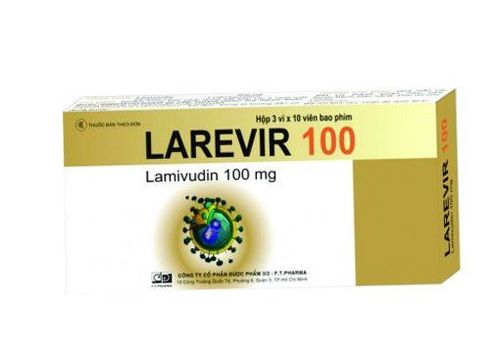This is an automatically translated article.
Combivir has two main ingredients, Zidovudine and Lamivudine, which are indicated in the treatment of HIV. So what are the uses, doses and precautions when using Combivir?
1. What are the uses of Combivir?
Combivir is a prescription drug approved by the US Food and Drug Administration (FDA) to treat HIV infection in adults and children weighing at least 30 kg. Combivir is always used in combination with other HIV medicines. Combivir has two main ingredients: Zidovudine and Lamivudine. Lamivudine is a cytosine analog that inhibits HIV reverse transcriptase via viral DNA chain termination, and inhibits RNA and DNA-dependent DNA polymerase activity. Zidovudine is a thymidine analog that interferes with the HIV RNA-dependent DNA polymerase, resulting in inhibition of viral replication. The combination of zidovudine and lamivudine is synergistic to inhibit reverse transcriptase as well as to delay the emergence of resistance-causing mutations.
Combivir is indicated for the treatment of HIV. The drug is contraindicated in patients with known hypersensitivity to lamivudine or zidovudine, or to any component of the formulation. In general, HIV drugs cannot cure HIV/AIDS, but taking HIV medicine every day will help people living with HIV live longer, healthier lives. HIV medications also reduce the risk of HIV transmission. If the patient is taking HIV medication, do not reduce the dose or stop taking it unless directed by the doctor.
2. What is the dose of Combivir?
Adults
HIV treatment: Take 1 tablet of Lamivudine 150mg/Zidovudine 300mg) x 2 times/day. Renal impairment: If CrCl ≥50 mL/min: No dosage adjustment is required. If CrCl <50 mL/min: Combivir is not recommended. Patients should use the individual ingredients adjusted to the dose). Hepatic impairment: Combivir is not recommended for use. Patients should use the individual ingredients adjusted to the dosage. Children:
HIV treatment: Children and adolescents weighing ≥30 kg: Take 1 tablet x 2 times/day Renal impairment: When CrCl <50 mL/min, not recommended Liver failure: Use no recommended. Patients should consider individual antiretroviral agents and reduce their dosage accordingly.
3. Combivir side effects
During the use of Combivir, patients may experience some of the following side effects:
Common side effects of Combivir may include: headache, nausea, diarrhea, fatigue, other symptoms. cold symptoms such as stuffy nose, sneezing, sinus pain, cough, loss of body fat (especially in the arms, legs, face and buttocks). Combivir can also cause liver problems such as swelling around the midsection, right upper abdomen pain, loss of appetite, dark urine, clay-colored stools, jaundice (yellowing of the skin or eyes), anemia, pale skin, unusual tiredness, feeling light-headed or short of breath, cold hands and feet, low white blood cell count, sore throat, cough, shortness of breath, pancreatitis, severe pain in upper abdomen spreading to back, nausea and vomiting. Lamivudine and Zidovudine affect the immune system and can cause certain side effects (even weeks or months after taking them). Tell your doctor if you have signs of a new infection such as fever, night sweats, swollen glands, sores, cough, wheezing, diarrhea, weight loss, trouble speaking or swallowing , problems with balance or eye movement, weakness or pins and needles, swelling in the neck or throat, menstrual changes, impotence. Mild symptoms of lactic acidosis can get worse over time, and the condition can be fatal. Patients should immediately seek medical attention if they have symptoms of unusual muscle pain, shortness of breath, stomach pain, vomiting, irregular heartbeat, dizziness, feeling cold.
4. Notes when using Combivir
While using Combivir, patients should be aware of the following issues:
Zidovudine can weaken the immune system and cause signs of infection (fever, mouth sores, sores on the upper body). skin, flu symptoms, pale skin). Long-term use of zidovudine can cause muscle weakness or loss of muscle tissue similar to "wasting syndrome" caused by HIV. Combivir can cause a serious condition called lactic acidosis. Call your doctor or get emergency medical help if you have unusual muscle pain, trouble breathing, stomach pain, dizziness, feeling cold, or feeling very weak. If the patient has had hepatitis B in the past, the disease may reactivate or get worse after stopping Combivir. Patients may need regular liver function tests for several months after stopping Combivir. Although effective viral suppression with antiretroviral therapy has been shown to significantly reduce the risk of sexual transmission of HIV, it cannot be completely ruled out. Precautions to prevent HIV transmission should be ensured. Anemia and leukopenia may occur in patients receiving Zidovudine. The risk is higher with higher doses of Zidovudine (1200-1500 mg/day) and in patients with poor bone marrow reserve prior to treatment, especially with advanced HIV disease. Therefore, hematological parameters should be carefully monitored in patients receiving Combivir. For patients with advanced symptomatic HIV disease, blood tests should be performed at least every two weeks for the first three months of treatment and at least monthly thereafter. Cases of pancreatitis have rarely occurred in patients treated with lamivudine and zidovudine. However, it is not clear whether these cases were due to ART or to underlying HIV disease. Combivir treatment should be discontinued immediately if clinical signs or laboratory abnormalities suggest pancreatitis. Patients co-infected with hepatitis C virus: Concomitant use of ribavirin and zidovudine is not recommended due to an increased risk of anemia. Osteonecrosis: Although etiology Osteonecrosis is multifactorial including corticosteroid use, alcohol consumption, severe immunosuppression, high body mass index. Cases of osteonecrosis have been reported in patients with advanced HIV disease and/or long-term exposure to combination antiretroviral therapy. Patients should seek medical attention if they experience joint pain, stiffness or difficulty in movement. Pregnancy: According to current data, the use of zidovudine in pregnant women has been shown to reduce the rate of HIV transmission from mother to fetus. Multiple data on pregnant women receiving lamivudine or zidovudine show no malformative toxicity. Lactation: Both lamivudine and zidovudine are excreted in human milk at concentrations similar to those found in serum. Mothers with HIV should not breastfeed under any circumstances to avoid HIV transmission.
5. Drug interactions
Drug interactions that may alter the therapeutic effect and/or increase the toxicity of the drug. The following are some drug interactions to watch out for when using Combivir:
Combivir should not be taken with any other medicinal products containing Lamivudine or medicinal products containing Emtricitabine. Co-administration of Lamivudine with Cladribine Lamivudine and zidovudine is not recommended, and zidovudine is not significantly metabolized by cytochrome P450 enzymes nor inhibits or induces this enzyme system. Therefore, interactions with antiretroviral protease inhibitors, non-nucleoside drugs and other medicinal products metabolised by P450 enzymes are very unlikely. Above is information about uses, usage and precautions when using Combivir. This is a prescription drug, patients are not allowed to take it on their own, but need to consult a specialist before using it.
Follow Vinmec International General Hospital website to get more health, nutrition and beauty information to protect the health of yourself and your loved ones in your family.













